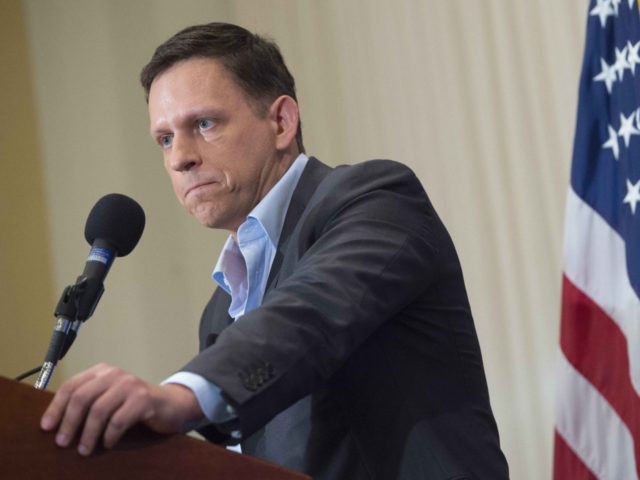Billionaire venture capitalist and PayPal co-founder Peter Thiel described the consequences of contemporary globalization as being at odds with its proponents’ promises during a Wednesday speech at Turning Point USA’s High School Leadership Summit in Washington, DC.
Thiel credited President Donald Trump with challenging the orthodoxy of support for globalization:
[Donald Trump] has called into question some sacred ideas that actually do need to be questioned a great deal. … I want to focus on one in particular, which was sort of the Bush-Clinton dynasty consensus for twenty years, from 1988 to 2008, at least. It was this idea that globalization is both true and good and good, desirable. I’m going to try to unpack that a little bit and suggest why criticizing that idea is sort of an incredibly healthy corrective in our society.
Thiel offered his definition of “globalization”:
[Globalization] is one of these words that can mean a lot of different things. I think the main sense behind it is that we’re heading towards a world with no borders, a unified world, a relatively homogeneous world in which the differences between people and countries will go away; a more equal world, in some ways.
Thiel noted globalization’s enjoyment of bipartisan political support across Republican and Democrat administrations following the Soviet Union’s collapse:
The way this was conceived in 1989 after the fall of communism and the Berlin Wall was that it was going to be a world in which liberal democracy prevailed, a world in which U.S. and multinational institutions would play a leading role. … The way the Clintons and Bushes would talk about it was that it was both a fact, a fact of life, or maybe that it had already happened, and that it was a moral imperative, and we had to work really hard to make it happen. It was sort of like the way people talked about communism in the 1900s; it was inevitable and you had to join the communist revolution. … They believed it was a done deal, it was inevitable, and you had to to sort of make sure you were on the right side of history, and that you worked to help globalization happen.
Thiel said globalization’s harms became more apparent in the last decade:
The abstractions around globalization often obscured all these ways in which things weren’t quite working. I think if we sort of look on the last decade, the tide has really gone out on us, and it has been going the other way for some time. We can think of the Financial crisis in 2008 as a failure of globalization.
Thiel described the Trump administration’s approach to globalization as a “realistic” countermeasure against the failed idealism of “pro-globalization” advocates:
Immigration and trade debates have come back with incredible force in the last few years. The pro-globalization side always deals in incredible abstractions, in theory how this stuff works perfectly, and then the sort of realistic Trump administration version of it is always to point out some of the very specific failings that we have to work on better.
Thiel framed the status quo of international trade as “totally at odds” with the promises of “free trade theory”:
In theory, free trade means that you shouldn’t have big trade deficits because you should be exporting about as much as you’re importing, and in fact the trade theory suggests that the U.S. should have trade surpluses in a globalizing world because you’ll be investing money in emerging market countries as they converge. That’s sort of how globalization works in theory, and this is sort of how globalization worked in the 19th century. In 1900, Great Britain was the center of globalization, and it had a trade surplus of two percent of GDP [and] a current accounts surplus at four percent of GDP, and the money got invested from Britain into faster growing countries like Argentina or Russia … but that whole thing didn’t work out when World War I started, but that’s in theory what it should look like. Instead, we have a world where the U.S. has massive trade deficits with China. We export a $100 billion a year to China, import $475 billion, and then the other side of that is the $375 billion gets sent from China to invest in the U.S., so you have this really weird dynamic where the money is sort of flowing uphill from a fast-growing China into a slower growing U.S. and an even slower growing Japan and Eastern Europe. That fact tells you that whatever the free trade theory says, what is actually happening is totally at odds with that.
Thiel concluded, “Immigration [and] trade, in theory they’re great. In practice, they’re not working remotely the way they’re advertised.”
Follow Robert Kraychik on Twitter.

COMMENTS
Please let us know if you're having issues with commenting.